Science
At Croxby Primary School we are Scientists!
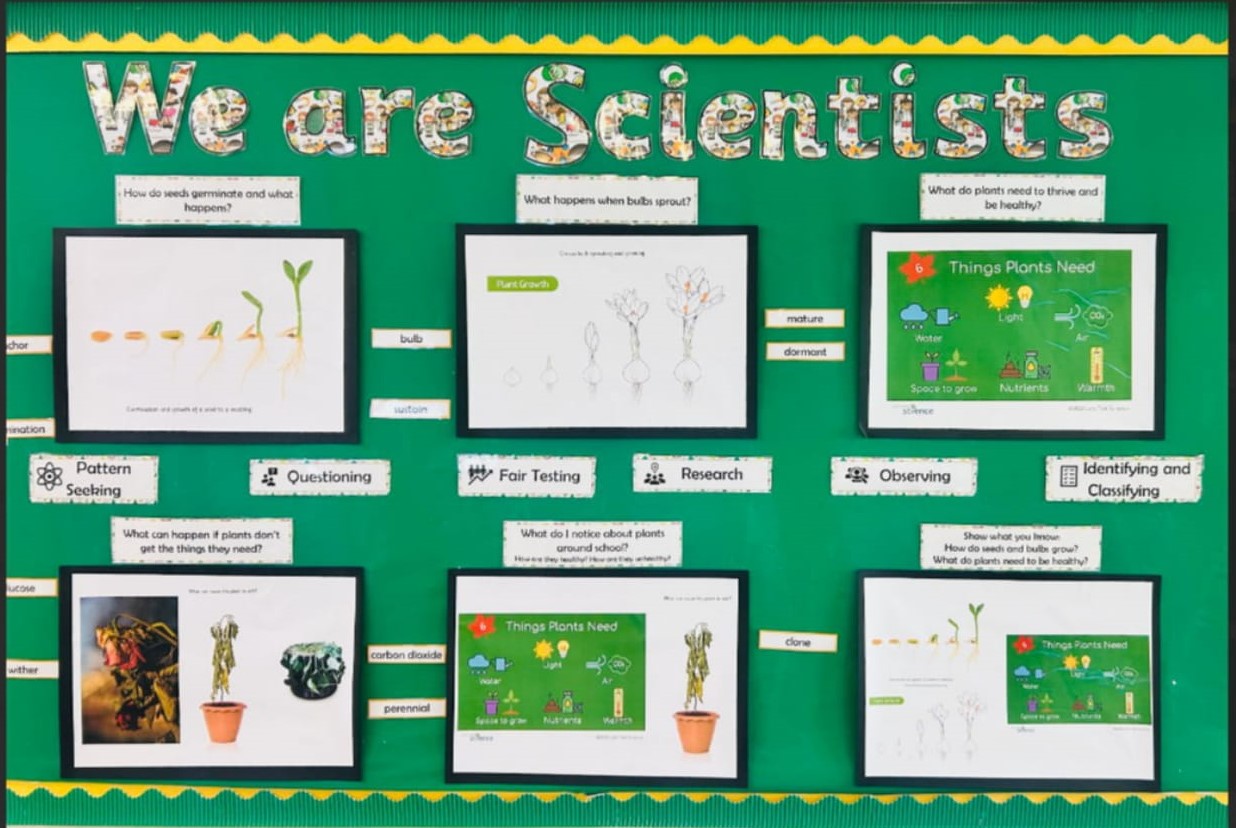
Intent
At Croxby Primary School, WE ARE SCIENTISTS!
Our intent is to give every child a broad and balanced Science curriculum which enables them to confidently explore and discover what is around them, so that they have a deeper understanding of the world we live in.
We want our children to love science. We want them to have no limits to what their ambitions are and grow up wanting to be astronauts, forensic scientists, toxicologists or microbiologists.
To achieve this, it involves exciting, practical hands-on experiences, coupled with enrichment opportunities that encourage curiosity and questioning. Our aim is that these stimulating and challenging experiences help every child secure and extend their scientific knowledge and vocabulary, as well as promoting a love and thirst for learning.
At Croxby Primary we are studying CUSP science. Through this pupils become more expert as they progress through the curriculum, accumulating, connecting and making sense of the rich substantive and disciplinary knowledge.
- Substantive knowledge - this is the subject knowledge and explicit vocabulary used to learn about the content. In CUSP science, an extensive and connected knowledge base is constructed so that pupils can use these foundations and integrate it with what they already know.
- Disciplinary knowledge – this is knowing how to collect, use, interpret, understand, and evaluate the evidence from scientific processes. This is taught.
Scientific analysis is developed through IPROF criteria. We call it ‘Thinking Scientifically.’
- identifying and classifying
- pattern seeking
- research
- observing over time
- fair and comparative testing
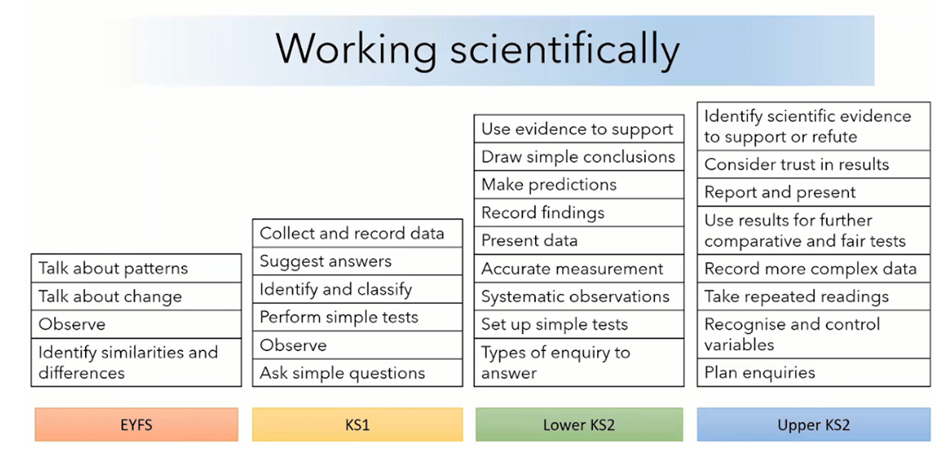
Implementation
CUSP Science is built around the principles of cumulative knowledge. The effect of this cumulative model supports opportunities for children to associate and connect with significant periods of time, people, places and events. An essential component to CUSP lessons is the systematic and coherent approach that we embed, focusing on the six phases of a lesson.

*Knowledge notes are an elaboration in the core knowledge found in knowledge organisers. Knowledge notes focus pupils’ working memory to the key question that will be asked at the end of the lesson. It reduces cognitive load and avoids the split-attention effect.
* Retrieval practise is planned into the curriculum through spaced learning and interleaving and as part of considered task design by the class teacher. Teaching and learning resources and provided for class teachers so they can focus their time on subject knowledge and task design.
*Explicit Vocabulary is purposefully sequenced into the CUSP curriculum to ensure Tier 2 and 3 vocabulary are explicitly taught along with the etymology and morphology, relevant idioms and colloquialisms to ensure learning sticks. We aim to provide a high challenge with low threat culture and put no ceiling on any child’s learning, instead providing the right scaffolding for each child for them to achieve.
*Misconceptions are challenged carefully and in the context of the substantive and disciplinary knowledge. In CUSP Science, it is recommended that misconceptions are not introduced too early, as pupils need to construct a mental model in which to position that new knowledge.
Impact
The impact of this curriculum design will lead to outstanding progress over time across key stages relative to a child’s individual starting point and their progression of skills.
HOW DO WE KNOW WHAT CHILDREN HAVE LEARNED?
- Questioning
- Pupil Book Study (talking about learning with the children)
- Talking to teachers
- Low stakes ‘Drop-in’ observations
- Quizzing and retrieval practise
- Live feedback
- Progress in book matches the curriculum intent
Children will therefore be expected to leave Croxby Primary reaching at least age-related expectations for Science. Our Science curriculum will also lead pupils to be enthusiastic learners, evidenced in a range of ways, including pupil voice and their work.
What is my child learning?
Here is the science long-term overview.
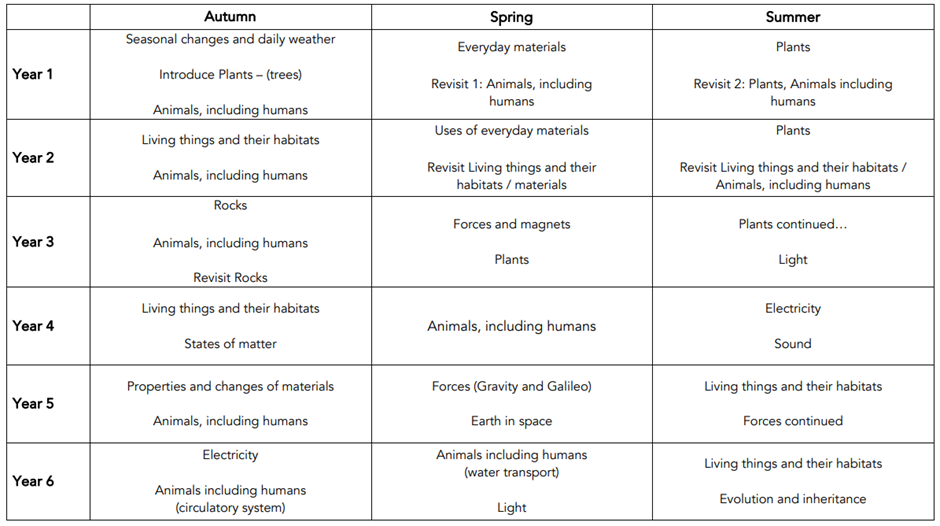
EYFS
The Early Years Foundation Stage Curriculum supports children’s understanding of science through the planning and teaching of ‘Understanding the World’. We work in the areas of ‘the natural world’ where we explore plants and animals including humans, everyday materials, seasonal changes and weather including environmental change, forces and how things work and working scientifically.
Children find out about objects, materials and living things using all of their senses looking at similarities, differences, patterns and change. Our science learning is developed by building on existing understanding and experiences our children already have of the natural environments through stories. Our children enjoy the valuable experiences gained from exploring our activities and school ground environment. Children enjoy spending time outdoors exploring mini-beasts and their habitats, observing the changing seasons, plants and animals. Children regularly participate in cookery and baking sessions which allows them to experience changes in state as ingredients are mixed, heated and cooled.
Our skilled early years practitioners encourage curiosity and explorative play, where our children are motivated to ask questions about why things happen and how things work, through discussions that follow on from experiences enjoyed within the school day. We support children by discussing, commenting and asking questions about what they observe about the world around them and are encouraged to be active learners and explore their interests further. We raise questions such as, ‘How are the seeds the same and different?’, ‘I’m wondering, how are animals and humans the same and different?’, Which material would be best for...? Why do you think this?’, ‘Tell me, what season is it in the ‘Squirrels who Squabbled’? How do you know? Why do squirrels store food?’, ‘In ‘Clean Up!’ humans have not looked after the world. Can you tell me what we are doing wrong?’, ‘Tell me, which action do I need to do to make this work? Push? Pull? Both?’ and ‘How has this plant changed over time? Why? How do we know this?’
Use of language relating to the natural world is used in daily conversations with children for example, ‘life cycle’, ‘similarities’, ‘sort’, ‘flexible’, ‘experiment’, ‘change’, ‘action’, ‘ideas’, ‘explore’, ‘find out’ as well as using the names of the seasons, types of weather and body parts. We ensure we are preparing our young scientists by equipping them with the necessary skills to be successful in their future science learning by developing the disciplinary skills at an early stage.
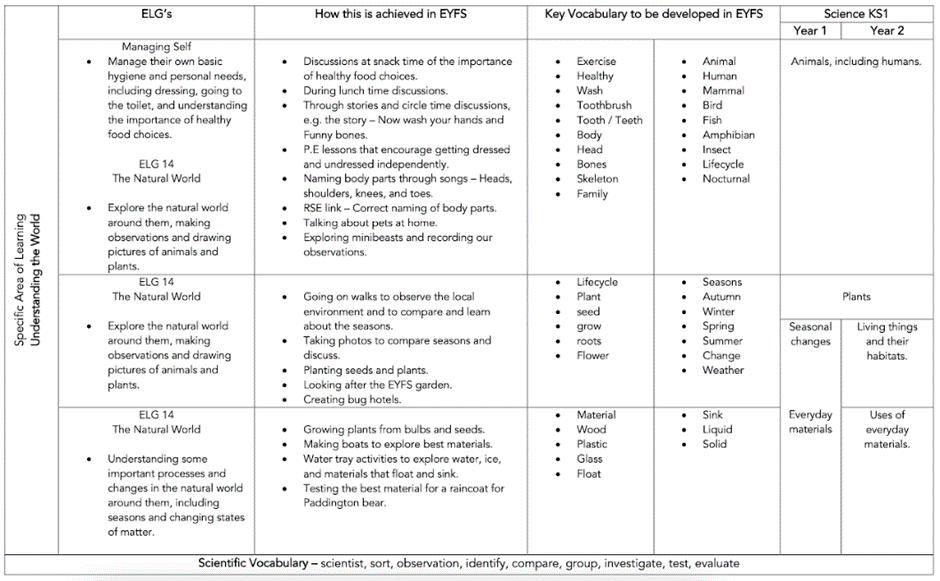
KEY STAGE 1
Pupils study the Seasons and develop an early conceptual understanding of how day becomes night. An understanding of change over time connects to the study of Plants, including trees. This focus enables children to associate trees as belonging to the plant kingdom and notice the changes deciduous trees go through connected to the seasons.
Contrasting that study, pupils learn about Animals, including humans. Non-examples of plants are used to contrast the features of an animal.
Pupils are introduced to identifying and classifying materials. Scientific terms, such as transparent, translucent and opaque are taught explicitly through vocabulary instruction and pupils make further sense by applying it to what they know and then to working and thinking scientifically tasks. This substantive knowledge is enriched by pupils’ use of disciplinary knowledge through scientific enquiry.
Within the study of Living things and their habitats and Uses of everyday materials new substantive knowledge is constructed and made sense of through Working and Thinking scientifically tasks.
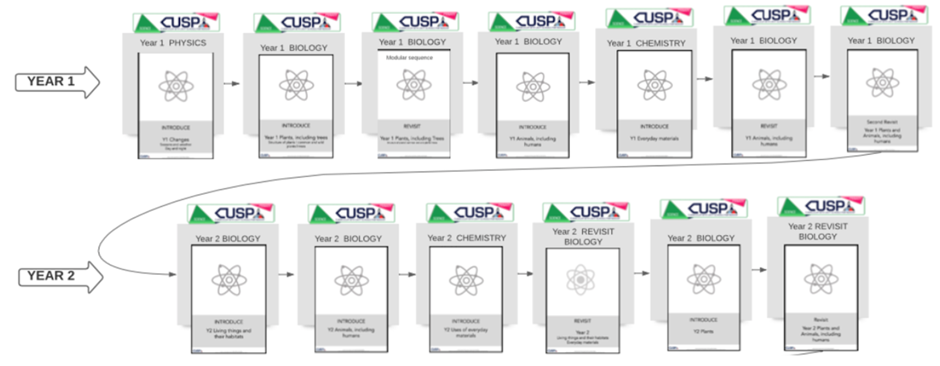
LOWER KEY STAGE 2
The unit on Rocks is studied and connected with prior knowledge from ‘Everyday materials’ in KS1. A study of Animals, including humans is built upon from KS1 and contrasts the physical features with the functions they perform, including the skeleton and muscles.
Rocks is revisited again to sophisticate and deepen pupils’ knowledge, advancing their understanding.
Forces and magnets are introduced and connect with KS1 materials, including twisting, bending and squashing. Contact and non-contact forces are taught and understanding applied through Working and Thinking Scientifically. The abstract concept of Light is made concrete through knowing about light sources and shadows. Plants are studied to develop a more sophisticated understanding of their parts and functions, including pollination.
A study of Living things and their habitats pays close attention to classification and is directly taught using prior knowledge to ensure conceptual frameworks are secure. Animals, plants and environments are connected in this study with a summary focusing on positive and negative change.
Electricity is introduced and pupils acquire understanding about electrical sources, safety and components of a single loop circuit.
Animals, including humans focuses on the sequence of digestion, from the mouth to excretion.
States of matter and Sound are taught using knowledge of the particle theory. Practical scientific tasks and tests help pupils build a coherent understanding of the particle theory by applying what they know through structured scientific enquiry.
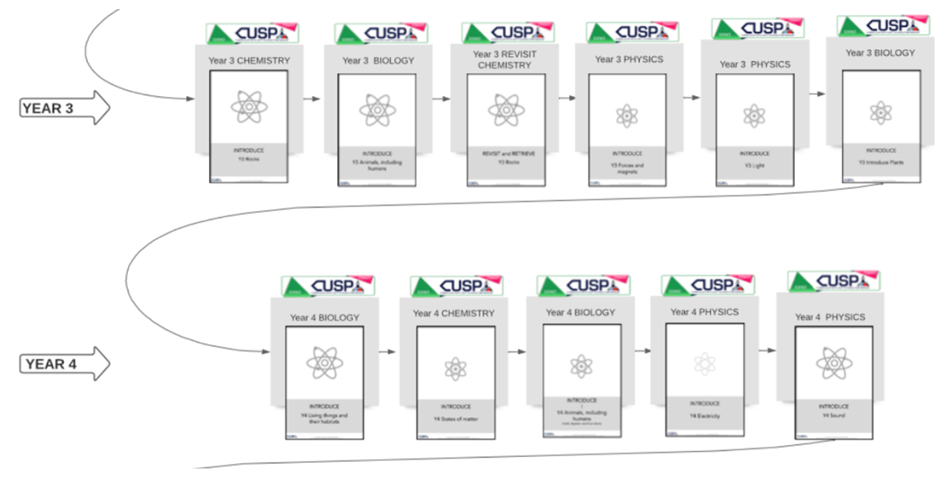
UPPER KEY STAGE 2
Pupils reuse and draw upon their understanding of states of matter in the study of Properties and changes of materials.
Change is also studied within Animals, including humans, focusing on growth and development of humans and animals.
Earth in Space develops the conceptual understanding of our place in the universe.
A study of Forces sophisticates the substantive knowledge acquired in KS1 and LKS2. Enhancing this study of Forces, pupils learn about Galileo Galilei 1564 - 1642 (considered the father of modern science).
Living things and their habitats focuses on differences in life cycles of living things and how they reproduce. This study also contrasts previous scientific thinking.
A further study of Living things and their habitats enables pupils in UKS2 to revisit and add to their understanding of classification through the taxonomy created by Carl Linnaeus. More complex animals are studied.
Light is revisited and taught with advanced substantive knowledge. This is physics study with a focus on the properties of light, not the biology of the eye.
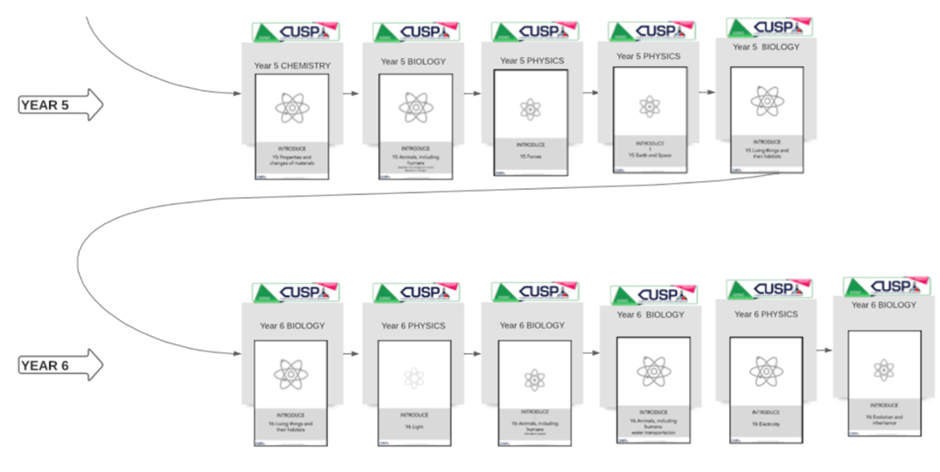
Progression Booklets
